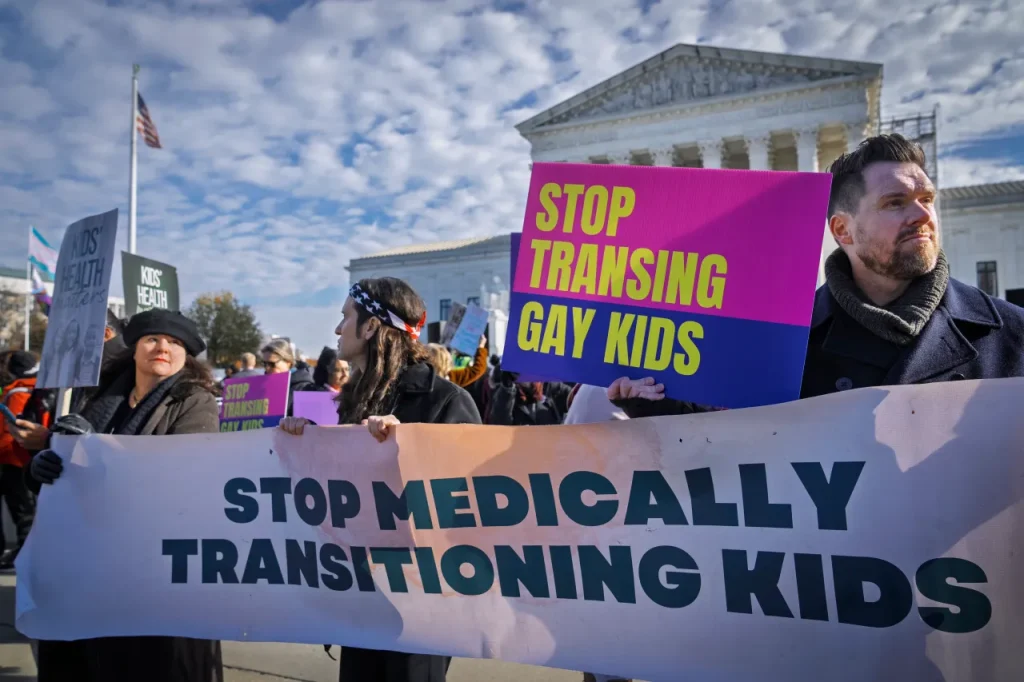Now Reading: Supreme Court Weighs Transgender Health Care Ban Amid Conservative Skepticism
-
01
Supreme Court Weighs Transgender Health Care Ban Amid Conservative Skepticism
Supreme Court Weighs Transgender Health Care Ban Amid Conservative Skepticism

The U.S. Supreme Court has taken up a landmark case that could reshape the national landscape for transgender rights, reviewing Tennessee’s ban on gender-affirming health care for transgender minors. With similar laws enacted in 26 states, the case underscores the intensifying debate over the rights of transgender individuals and the balance between state and federal authority.
Key Issues at Stake
The case centers on Tennessee’s controversial law, which prohibits doctors from providing gender-affirming treatments, including hormone therapies and puberty blockers, to minors. The law’s proponents argue it protects children from making irreversible decisions, while critics say it strips families of the right to determine the best care for their children and increases risks for transgender youth.
- Conservative Justices’ Skepticism:
During oral arguments, Chief Justice John Roberts and Justice Amy Coney Barrett questioned whether the law constitutes sex discrimination. Roberts emphasized the traditional role of states in regulating medical practices, suggesting the law could fall within their jurisdiction. - Liberal Justices’ Concerns:
Justice Sonia Sotomayor highlighted the mental health risks associated with denying gender-affirming care, including the heightened rates of suicide among transgender youth. She argued that such bans could disproportionately harm a vulnerable population.
A Potential Turning Point for Transgender Rights
This case marks the first time the Supreme Court has addressed a statewide ban on gender-affirming care, following its 2020 decision in Bostock v. Clayton County, which expanded workplace protections for LGBTQ+ individuals. A ruling in favor of Tennessee could embolden other states to pass similar laws, while a decision against it could strike down existing bans and affirm federal protections for transgender individuals.

The Broader Implications
Beyond health care, this case could set a precedent influencing other areas of transgender rights, including:
- Sports Participation:
Ongoing debates about transgender athletes in competitive sports may hinge on how the Court interprets sex-based classifications. - Bathroom Access:
Policies governing access to bathrooms and other facilities could also be affected by the ruling.
Arguments from Both Sides
- Supporters of Tennessee’s Law:
Proponents, including conservative lawmakers and advocacy groups, argue the ban protects minors from potentially harmful and irreversible medical treatments. They emphasize that children lack the maturity to make life-altering medical decisions. - Challengers of the Law:
Opponents contend that the ban infringes on parental rights and denies necessary, evidence-based care for transgender youth. They cite research linking access to gender-affirming care with improved mental health outcomes.
A Decision Months Away
The Supreme Court’s ruling is expected by mid-2024 and could have profound implications for the LGBTQ+ community and state sovereignty. With emotions running high on both sides, this decision will likely spark ongoing debates about civil rights, medical ethics, and the role of government in personal health care decisions.
What are your thoughts on the Supreme Court’s review of Tennessee’s gender-affirming care ban? Should states have the authority to regulate these treatments, or does this infringe on civil rights? Share your views below.
Tags:
SCOTUS, Transgender Rights, Tennessee Law, Gender Affirming Care, LGBTQ+, Equality, Trans Youth, Health Care Ban, Conservative Justices, Civil Rights, Supreme Court, State Policy



















